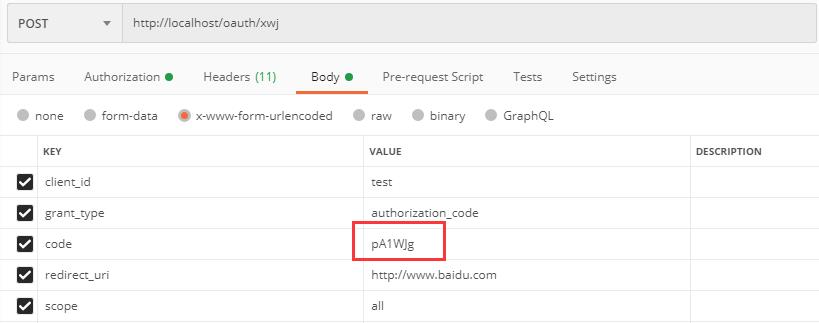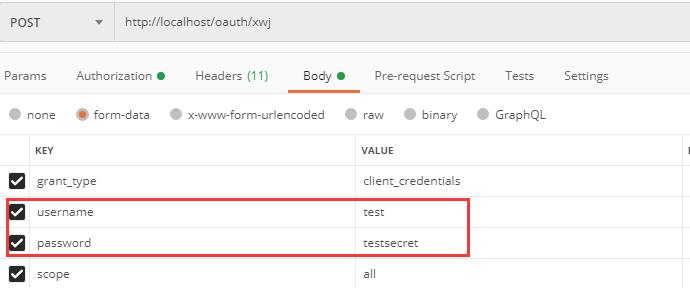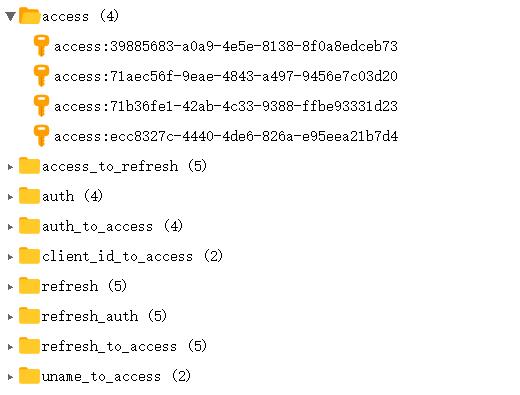使用OAuth2实现认证服务器和资源服务器
Posted 仅此而已-远方
tags:
篇首语:本文由小常识网(cha138.com)小编为大家整理,主要介绍了使用OAuth2实现认证服务器和资源服务器相关的知识,希望对你有一定的参考价值。
在项目中有用到OAuth2,这里记录下研究成功。详细介绍可参考官方文档:https://tools.ietf.org/html/rfc6749
准备工作:
1、spring-oauth-server 认证服务器和资源服务器(也可以分开)。作为一个jar包提供给客户端使用
2、spring-security-demo 客户端。资源所有者,需要依赖spring-oauth-server进行授权认证
spring-oauth-server
pom依赖:
<dependency>
<groupId>org.springframework.cloud</groupId>
<artifactId>spring-cloud-starter-oauth2</artifactId>
</dependency>
<dependency>
<groupId>org.springframework.boot</groupId>
<artifactId>spring-boot-starter-data-redis</artifactId>
</dependency>
RedisTokenStore配置:
@Configuration public class RedisTokenStoreConfig { @Autowired private RedisConnectionFactory connectionFactory; /** * 配置Token存储到Redis中 */ @Bean public TokenStore redisTokenStore() { return new RedisTokenStore(connectionFactory); } }
两个配置类SecurityProperty和OAuth2Property:
@Getter @Setter @Configuration @ConfigurationProperties(prefix = "xwj.security") public class SecurityProperty { private OAuth2Property oauth2 = new OAuth2Property(); }
@Getter @Setter public class OAuth2Property { private OAuth2ClientProperty[] clients = {}; }
认证服务器配置:
/** * 配置认证服务器 */ @Configuration @EnableAuthorizationServer // 开启认证服务 public class AuthorizationServerConfig extends AuthorizationServerConfigurerAdapter { @Autowired private AuthenticationManager authenticationManager; @Autowired private UserDetailsService userDetailsService; @Autowired private SecurityProperty securityProperty; @Autowired private TokenStore tokenStore; /** * 用来配置授权(authorization)以及令牌(token)的访问端点和令牌服务(token services) */ @Override public void configure(AuthorizationServerEndpointsConfigurer endpoints) throws Exception { endpoints.tokenStore(tokenStore) // 配置存储token的方式(默认InMemoryTokenStore) .authenticationManager(authenticationManager) // 密码模式,必须配置AuthenticationManager,不然不生效 .userDetailsService(userDetailsService); // 密码模式,这里得配置UserDetailsService /* * pathMapping用来配置端点URL链接,有两个参数,都将以 "/" 字符为开始的字符串 * * defaultPath:这个端点URL的默认链接 * * customPath:你要进行替代的URL链接 */ endpoints.pathMapping("/oauth/token", "/oauth/xwj"); } /** * 用来配置客户端详情服务(给谁发送令牌) */ @Override public void configure(final ClientDetailsServiceConfigurer clients) throws Exception { InMemoryClientDetailsServiceBuilder builder = clients.inMemory(); OAuth2ClientProperty[] oauth2Clients = securityProperty.getOauth2().getClients(); if (ArrayUtils.isNotEmpty(oauth2Clients)) { for (OAuth2ClientProperty config : oauth2Clients) { builder // 使用in-memory存储 .withClient(config.getClientId()).secret(config.getClientSecret()) .accessTokenValiditySeconds(config.getAccessTokenValiditySeconds()) // 发出去的令牌有效时间(秒) .authorizedGrantTypes("authorization_code", "client_credentials", "password", "refresh_token") // 该client允许的授权类型 .scopes("all", "read", "write") // 允许的授权范围(如果是all,则请求中可以不要scope参数,否则必须加上scopes中配置的) .autoApprove(true); // 自动审核 } } } }
认证服务器端点配置:
1、token模式默认存储在内存中,服务重启后就没了。这里改为使用redis存储,同时也可用于客户端扩展集群
2、如果要使用密码模式,必须得配置AuthenticationManager(原因可查看源码AuthorizationServerEndpointsConfigurer的getDefaultTokenGranters方法)
3、在使用密码模式时,如果用户实现了UserDetailsService类,则在验证用户名密码时,使用自定义的方法。因为在校验用户名密码时,使用了DaoAuthenticationProvider中的retrieveUser方法(具体可参考AuthenticationManager、ProviderManager)
4、默认获取token的路径是/oauth/token,通过pathMapping方法,可改变默认路径
客户端配置:
1、这里是从配置类中读取clientId、clientSecret、有效期等,便于扩展
2、authorizedGrantTypes,授权认证类型,这里配置的是授权码模式、客户端模式、密码模式、刷新token模式(还有一种简化模式,这里不演示)
3、如果不配置autoApprove,那获取授权码时,需要手动点一下授权
资源服务器配置:
@Configuration @EnableResourceServer // 开启资源服务 public class ResourceServerConfig extends ResourceServerConfigurerAdapter { @Override public void configure(HttpSecurity http) throws Exception { super.configure(http); } }
使用默认的配置,表示对所有资源都需要授权认证,即授权通过后可以访问所有资源
spring-security-demo
pom依赖:
<dependency>
<groupId>org.springframework.boot</groupId>
<artifactId>spring-boot-starter-web</artifactId>
</dependency>
<dependency>
<groupId>org.springframework.boot</groupId>
<artifactId>spring-boot-starter-data-jpa</artifactId>
</dependency>
<dependency>
<groupId>mysql</groupId>
<artifactId>mysql-connector-java</artifactId>
</dependency>
<!-- druid 数据库连接池 -->
<dependency>
<groupId>com.alibaba</groupId>
<artifactId>druid</artifactId>
<version>1.0.5</version>
</dependency>
<dependency>
<groupId>com.xwj</groupId>
<artifactId>spring-oauth-server</artifactId>
<version>0.0.1-SNAPSHOT</version>
</dependency>
application.yml配置文件:
server: port: 80 spring: application: name: spring-security-demo #应用程序名称 #durid 数据库连接池 datasource: driver-class-name: com.mysql.jdbc.Driver type: com.alibaba.druid.pool.DruidDataSource url: jdbc:mysql://127.0.0.1:3306/xwj?autoReconnect=true&failOverReadOnly=false&createDatabaseIfNotExist=true&useSSL=false&useUnicode=true&characterEncoding=utf8 username: root password: 123456 jpa: open-in-view: true hibernate: ddl-auto: update #show-sql: true properties: hibernate.dialect: org.hibernate.dialect.MySQL57InnoDBDialect redis: database: 2 #Redis数据库索引(默认为0) host: localhost #Redis服务器地址 port: 6379 password: ## 密码(默认为空) pool: max-active: 8 #连接池最大连接数(使用负值表示没有限制) max-wait: -1 #连接池最大阻塞等待时间(使用负值表示没有限制) max-idle: 8 #连接池中的最大空闲连接 logging: level: #root: INFO #org.hibernate: INFO jdbc: off jdbc.sqltiming: debug com: xwj: debug xwj: security: oauth2: storeType: redis jwtSignKey: 1234567890 clients[0]: clientId: test clientSecret: testsecret accessTokenValiditySeconds: 1800 clients[1]: clientId: myid clientSecret: mysecret accessTokenValiditySeconds: 3600
新建UserDetailsService的实现类MyUserDetailServiceImpl类:
/** * 如果使用密码模式,需要实现UserDetailsService,用于覆盖默认的InMemoryUserDetailsManager方法 * * 可以用来校验用户信息,并且可以添加自定义的用户属性 */ @Service public class MyUserDetailServiceImpl implements UserDetailsService { @Autowired private IUserService userService; /** * 根据username查询用户实体 */ @Override public UserDetails loadUserByUsername(String username) throws UsernameNotFoundException { // 通过用户名查询数据 AuthUserInfo userInfo = userService.findByUsername(username); if (userInfo == null) { throw new BadCredentialsException("User \'" + username + "\' not found"); } // 用户角色 List<? extends GrantedAuthority> authorities = AuthorityUtils .commaSeparatedStringToAuthorityList("ROLE_" + userInfo.getRole()); return new SocialUser(username, userInfo.getPassword(), true, true, true, true, authorities); } }
新建一个密码加密的配置类,用来实现PasswordEncoder(默认的加密方式是BCryptPasswordEncoder)
/** * 加密方式配置 */ @Configuration public class PasswordEncoderConfig { @Bean public PasswordEncoder passwordEncoder() { return new PasswordEncoder() { @Override public String encode(CharSequence rawPassword) { return DigestUtils.md5DigestAsHex(rawPassword.toString().getBytes()); } @Override public boolean matches(CharSequence rawPassword, String encodedPassword) { return encodedPassword.contentEquals(encode(rawPassword)); } }; } }
用户信息实体:
@Entity @Getter @Setter public class AuthUserInfo { @Id @TableGenerator(name = "global_id_gen", allocationSize = 1) @GeneratedValue(strategy = GenerationType.TABLE, generator = "global_id_gen") private Long id; /** 用户名 */ private String username; /** 密码 */ private String password; /** 角色 */ private String role; }
数据访问层,自己实现。造一条用户数据(角色只能为USER,在获取授权码的时候需要拥有该角色的用户进行表单登录):

新建一个IndexController:
@RestController @RequestMapping("index") public class IndexController { /** * 获取资源 */ @GetMapping("/getResource") public String getResource() { return "OK"; } /** * 获取当前授权用户 */ @GetMapping("/me") public Object getCurrrentUser(@AuthenticationPrincipal UserDetails user) { return user; } }
1、授权码模式:
1.1、 浏览器请求如下地址,获取授权code(其中response_type=code是固定写法,scope为权限,state为自定义数据):
http://localhost/oauth/authorize?client_id=test&redirect_uri=http://www.baidu.com&response_type=code&scope=read &state=mystate
1.2、输入用户名密码(xwj/123456):

1.3、上面配置的自动授权,所有会oauth会立马调用回调地址并返回授权code和state(可以发现state传的什么就返回什么):

1.4、在获得授权码后,接下来获取访问令牌。使用postman请求 http://localhost/oauth/xwj:

注意,需要在Authorization里设置Username和Password(就是客户端配置的clientId和clientSecret),还有TYPE类型:

获取到的token如下:

1.5、授权码用一次之后,oauth将会把它从缓存中删掉,所以只能使用一次。如果重复使用,将返回:

1.6、如果不带上token,请求资源:http://localhost/index/getResource,将会返回无权访问:

1.7、如果带上token,请求资源:http://localhost/index/getResource,将可以正常获取资源数据:

1.8、如果token错误,将提示无效的token:

2、客户端模式:
2.1、直接获取token,请求地址:http://localhost/oauth/xwj


获取token操作同上。由于客户端模式每次的参数是一样的,则请求多次返回同一个token,只是有效期在变小
3、密码模式:
3.1、直接获取token,请求地址:http://localhost/oauth/xwj


获取token操作同上。由于客户端模式每次的参数是一样的,则请求多次返回同一个token,只是有效期在变小
4、刷新token:
4.1、以授权码模式为例,在授权码的token过期后,使用当时的refresh_token获取新的token:


4.2、获取到新的token,就可以正常访问资源了:

使用redis存储token,打开Redis Desktop Manager工具,可以看到数据结构如下:

至此,演示完毕~~~
以上是关于使用OAuth2实现认证服务器和资源服务器的主要内容,如果未能解决你的问题,请参考以下文章